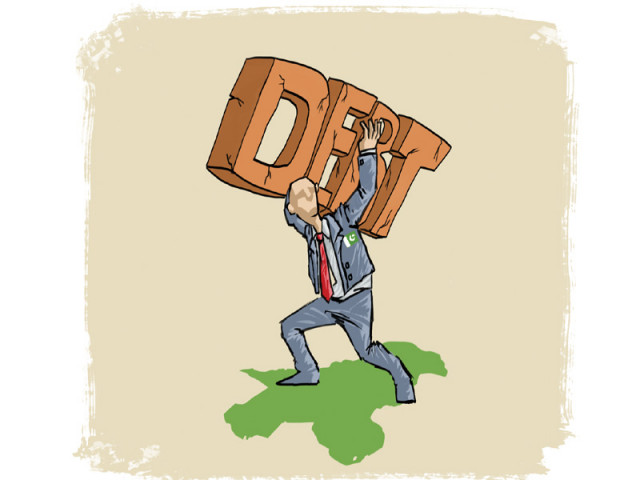Government mulls securitising assets in the power sector
Move to help raise money to retire the burgeoning circular debt.

The current financial position of oil and gas exploration companies may hamper their efforts to explore new reserves to overcome the energy crisis. ILLUSTRATION: JAMAL KHURSHID
The plan is being discussed following the failure of power distribution companies (Discos) to recover dues worth Rs425 billion from power defaulters. On the flip side of the circular debt coin, the power sector itself is liable to pay Rs435 billion to oil and gas suppliers.
Sources told The Express Tribune that the government had discussed securitising the assets of Discos, generation companies and the National Transmission and Despatch Company in order to settle the circular debt issue.
The plan was discussed in a recent meeting in the finance ministry, which was also attended by officials of the Ministry of Water and Power. According to the officials this correspondent talked to, the plan will be a part of the business strategy the interim setup intends to hand over to the incoming government.

The PPP-led government has left behind a crisis of gargantuan proportions in the oil and gas sector, and it will require nothing short of a herculean effort in order to fix it. The sector is on the verge of triggering a multi-sector crisis because of swelling receivables, which had reached Rs524 billion when the PPP government completed its tenure. The debt has now swelled to Rs537.9 billion under the interim setup, and will be handed over as is to the PML-N government when it takes the reins of power.
Official documents reveal that the country’s largest oil and gas explorer – the Oil and Gas Development Company (OGDC) – is deeply entrenched in the crisis: its receivables from oil refineries, gas companies and power producers amount to Rs136.91 billion. OGDC has no major liabilities as such, but a liquidity shortage due to the mounting receivables could seriously hurt the company.
A senior official said that the OGDC’s liquidity problem had grown to the point that other oil and gas firms that depend on the company are facing issues in running their operations due to a lack of cash.
“The current financial position of oil and gas exploration companies may hamper their efforts to explore new reserves to overcome the energy crisis,” a government official said, requesting anonymity.
The government’s estimates say that Pakistan’s domestic gas production capacity is expected to decline from 4,100 million cubic feet per day (mmcfd) presently to 1,600mmcfd by 2022. “If future exploration activities are hampered, there won’t be enough gas to meet domestic requirements,” the official added.
The financial position of another oil sector giant – Pakistan Petroleum (PPL) – is similar, as its receivables stand at Rs68.8 billion, while the company does not have any payables. “These two firms (OGDC and PPL) are major suppliers of oil and gas in the country; if they default, further exploration activities could stop, which will aggravate the energy crisis,” the official said.
Other state-owned oil and gas companies are also facing the brunt of the liquidity crisis due to mounting receivables. Government Holdings is owed Rs25.3 billion with zero payables, while Mari Gas Company is owed Rs26.26 billion and has liabilities of Rs17.3 billion.
Pakistan State Oil (PSO), perhaps the worst affected company according to official figures, has receivables of Rs124.18 billion on account of outstanding bills, mainly from the energy sector. The company itself owes Rs17.18 billion to local refineries.
Similarly, the Sui Southern Gas Company is owed Rs98.85 billion and is liable to pay Rs58.12 billion, whereas Sui Northern Gas Pipelines is entitled to receive Rs57.56 billion and pay Rs66.87 billion.
Published in The Express Tribune, May 17th, 2013.
Like Business on Facebook to stay informed and join in the conversation.



















COMMENTS
Comments are moderated and generally will be posted if they are on-topic and not abusive.
For more information, please see our Comments FAQ